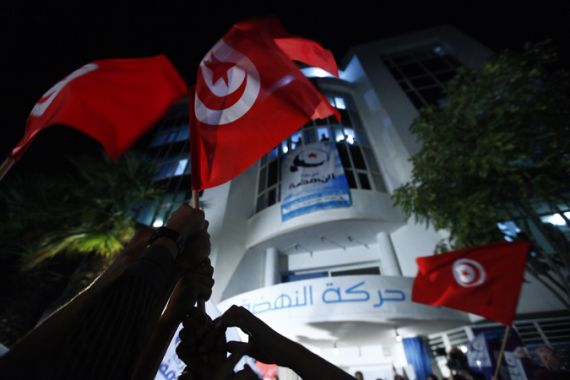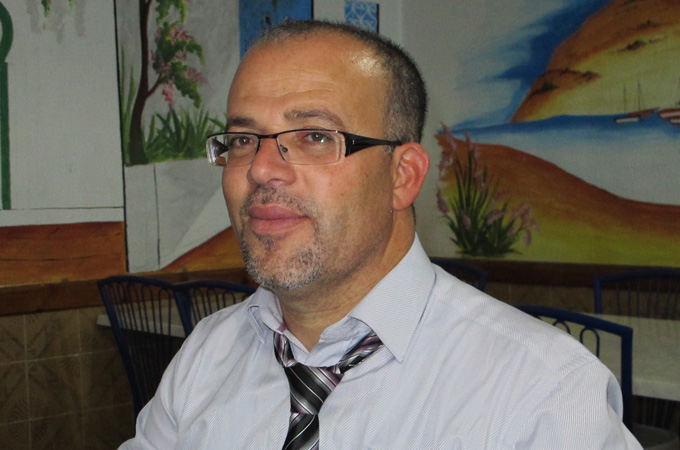Q&A: Triumphant Ennahdha’s rising star
Al Jazeera speaks with Samir Dillou, a prominent member of Ennahdha’s political bureau.

 |
| Samir Dillou is a prominent member of the religious Ennahdha party [Yasmine Ryan/Al Jazeera] |
TUNIS, Tunisia: Ennahdha, Tunisia’s moderate Islamist party, won a decisive majority in Sunday’s election.
While it declared victory on Monday, based on data from its own election observers, the party had been holding off on the real celebrations until Tunisia’s electoral authority (ISIE by its French acronym) announced the provisional results for all seats in the constituent assembly on Thursday.
According to results released by the ISIE, Ennahdha won 76 of the assembly’s 217 seats, and will be tasked with writing a new constitution, and appointing a new president and prime minister.
Before the results were announced, Al Jazeera’s Yasmine Ryan spoke with Samir Dillou, a senior member of the party’s political bureau, about the wait, negotiations with other parties, and Ennahdha’s preferred candidates for prime minister and president.
YR:What is the mood in Ennahdha following your party’s electoral victory, especially for members such as yourself, who lived through torture and imprisonment under the former regime?
SD: We’re not yet in power and it’s a tentative joy while we only have some provisional results. It’s a mixed feeling. We’re very happy, not only for Ennahdha, but also for the Tunisian people who have succeeded for the first time in their history to have a second revolution. The first part of this revolution was to purge the country of dictatorship and despotism, the second is taking first step in the long path to creating a democracy with stable and democratic institutions.
YR: We’ve been waiting for the complete preliminary results from the Tunisian electoral authority [ISIE] since the vote on Sunday, what do you make of this delay? Is it necessary?
SD: For the instant, we’re assuming it’s all in good faith, but we’re a little incredulous that the results are taking such a long time to be proclaimed. We hope they will be announced very soon.
YR: Do you think there are political reasons for the delay?
SD: I don’t want to believe it. For now, I am hanging on to the belief that it’s for logistical reasons, and that there’s no political motive.
YR: And once the provisional results have been announced, there will be a 48-hour period during which anyone can contest them. What will happen after this?
SD: The provisional president [Fouad Mebazaa] will summon the newly elected members [of the constituent assembly] before November 9 for the first plenary session, and it will go from there.
YR: According to the preliminary results we have so far, Ennahdha has won a massive majority. Do you think this is healthy in a country that is just starting out on the path of political pluralism, or is it dangerous for democracy that a single party is already so dominant?
SD: What matters for democracy and pluralism is that elections take place in optimal conditions. But I don’t think that Western democracies can look at these elections, which were fair and transparent, and say voters made the wrong choice. That would be hypocritical.
YR: Beji Caid Essebsi [Tunisia’s interim president] said in early October that he would like a role in the new government, and Ennahdha has just announced that it would not rule out Essebsi as a presidential candidate. Is this true?
SD: For the role of president of the republic, we are not ruling him out, but neither does he have more chance than the other potential candidates.
YR: And Ennahdha’s choice for the new prime minister is Hammadi Jebali, your party’s secretary-general?
SD: Personally, I never said this. There are some members of our political bureau who have said this, but in democracies, it’s the head of the winning party who works to form a national unity government.
YR: So in the meantime, there’s no preferred candidate?
SD: Out of respect to our political partners, we must wait until the assembly has met to decide on the possible choices.
YR: Said Firjani, one of your colleagues in the executive bureau, told me today that Ennahdha wants the president to come from another political party? Can you confirm this?
SD: Yes, this is most likely. For the moment, we don’t have any candidates of our own for the new president.
YR: How are the negotiations with the Congress Party for the Republic (CPR) and Ettakatol progressing?
SD: We are still at the stage of congratulating each other and setting up meetings, but we haven’t begun the serious negotiations.
YR: On Tuesday, a Belgian newspaper published comments by Ettakatol’s Mustapha Ben Jaâfar, in which he said he intends on putting forward his candidature for presidency. What is Ennahdha’s position? Could he be president?
SD: Maybe, why not? It’s a possibility to be considered, he is well-respected and so he has a reasonable chance.
You can follow Yasmine Ryan on Twitter: @yasmineryan